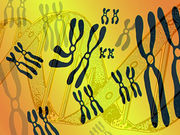Correlation seen between mutations and MRI brain findings
FRIDAY, Aug. 11, 2017 (HealthDay News) — Heterozygous HTRA1 mutations may play a role in familial cerebral small vessel disease (SVD), according to a study published online Aug. 6 in CNS Neuroscience & Therapeutics.
Ilaria Di Donato, M.D., from the University of Siena in Italy, and colleagues performed mutational analysis of HTRA1 gene in 142 NOTCH3-negative patients and 160 healthy age-matched controls.
The researchers found that five different HTRA1 heterozygous mutations were detected in nine patients from five unrelated families. In these patients, the clinical phenotype was typical of SVD, and the onset was pre-senile. A subcortical leukoencephalopathy, with involvement of the external and internal capsule, corpus callosum, and multiple lacunar infarcts, was seen on brain magnetic resonance imaging. Additionally, cerebral microbleeds were seen, but anterior temporal lobe involvement was not present.
“Our observation further supports the pathogenic role of the heterozygous HTRA1 mutations in familial SVD,” the authors write.
Copyright © 2017 HealthDay. All rights reserved.








